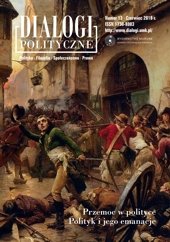Slobodan Milošević – demon czy zbawca narodu serbskiego?
DOI:
https://doi.org/10.12775/DP.2010.022Abstract
Slobodan Milošević’s brilliant political career began from the speech delivered on Kosovo Field in April 1987. The sentence ”nobody has the right to beat you” captivated Serbian crowds, complaining about discrimination from Kosovars. His theses about the necessity of reconstruction of the historical position of Serbia, the restoration of autonomic districts (Vojvodina and Kosovo) for the fatherland, found an acknowledgement in society. Taking an advantage of the situation, he conducted the ”antibureaucracy revolution”, which enabled him to gain power in the Communist Party. Milešević being only a messenger of his nation, executing his infallible will. Therefore the whole fame fell to the nation. On the other hand, the commander did not hold any responsibilities for defeats. The commander received support from a part of artistic environments and the Orthodox Church as well. The culture was the essential aspect of kindling the Serbian nationalism as well as the necessity to defend the Serbian language. According to many poets, Serbian culture was (is?) not limited to state borders, even to terrains where Serbian minority lived, but it was connected with ”spiritual space”, which was even where there had been no Serbs for decades (centuries). Through years Milošević was altering his rhetoric – he started with critic of nationalism, but in the end he became its propagator. There is no categorical answer to the question if Milošević was guilty of the break–up of Yugoslavia? It is doubtless that nationalisms among nations of former Yugoslavia caused the explosion of the bloody civil war. However, it might have been assumed that the economic and political situation created circumstances for radical moods to grow among nations of this state. Also the geopolitical situation changed fundamentally in 1991. Middle East conflict became a priority of the USA foreign policy, France and Great Britain weren’t involved themselves in saving Yugoslavia. In this circumstances, the war had already decided about the borders of the indenpendent republics. Over a decade of Slobodan Milošević’s rules brought Serbia to huge economic and political crisis. De facto, this country lost its importance in the region, as well as its territory (Kosovo). Many Serbs live outside Serbian boarders in Croatia, Bosnia and Kosovo as well. NATO raids ruined the infrastructure of the country, UN embargo ruined economy. In the years 1992 – 1994 inflation reached the world record of 313 million % (!). Milošević, overthrown in 2001, was passed on to the Hague War Crimes Tribunal, being accused of the heaviest crimes against mankind. The Court did not manage to judge him – he died for heart attack in a prison cell in 2006.Riferimenti bibliografici
M. J. Zacharias, Komunizm, federacja, nacjonalizmy. System władzy w Jugosławii 1943–1991. Powstanie – przekształcenia – rozkład, Warszawa 2004.
Slobodan Milosevic’s Biography, http://www.slobodan-milosevic.org/biography.htm [dostęp: 22.02.2010].
R. Orizio, Diabeł na emeryturze. Rozmowy z siedmioma dyktatorami, Poznań 2004, s. 173–175.
G. Partos, Analisys: Stambolić murder trial, http://news.bbc.co.uk/ 2/hi/europe/ 3511823.stm [dostęp: 15.03.3010].
N. Popov, Serbski dramat. Od faszystowskiego populizmu do Miloševicia, Warszawa 1994.
M. Rekść, Niewola mitu, [w]: Źródła nienawiści. Konflikty etniczne w krajach postkomunistycznych, red. K. Janicki, Warszawa–Kraków 2009, s. 42.
I. Čolović, Bałkany – terror kultury, Wołowiec 2007.
D. Šipka, Demokracja a interes narodowy w ujmowaniu sytuacji politycznej: przykład wojny w dawnej Jugosławii, Poznań 2002, s. 53–54.
A. Giza, Narodziny i rozpad Jugosławii, Szczecin 1994, s. 149.
M. Tabin, Kosowskie państwo podziemne: nadzieje i dylematy, [w]: Trudne sąsiedztwa. Z socjologii konfliktów narodowościowych, red. A. Jasińska-Kania, Warszawa 2001.
S. Milošević, Czas rozstrzygnięć, Warszawa 1990, s. 227–228.
Ch. Mylonas, Serbian orthodox fundamentals: the quest for an eternal identity, Budapest–New York, 2003, s. 125–126.
I. Rycerska, Rozpad Jugosławii. Przyczyny i przebieg, Kielce 2003, s. 75–76.
A. Balcer, Rola Kosowa jako centrum aktywności politycznej albańskiego ruchu narodowego i proces budowy odrębnej kosowskiej tożsamości państwowej, [w]: Albanistyka polska, red. I. Sawicka, Toruń 2007, s. 136 i n.
M. Tanty, Bałkany w XX wieku. Dzieje polityczne, Warszawa 2003, s. 348–351.
I. Čolović, Polityka symboli. Eseje o antropologii politycznej, Kraków 2001, s. 115.
A. Koseski, W bałkańskim tyglu, Pułtusk 2002, s. 176–177.
M. Waldenberg, Rozbicie Jugosławii: od separacji Słowenii do wojny kosowskiej, Warszawa 2003, s. 87–100.
R. K. Kent, Milošević, The Serbs and The West, http://romnews.com/community/ modules.php?op=modload&name=News&file=article&sid=397 [dostęp: 12.03.2010].
D. Gibas–Krzak, Serbsko-albański konflikt o Kosowo w XX wieku. Uwarunkowania – przebieg – konsekwencje, Toruń 2009, s. 167–204.
N. Chomsky, The New Military Humanism. Lessons from Kosovo, London 1999, s. 3–5.
M. Marszałek, Sojusznicza operacja „Allied Force”. Przebieg – ocena – wnioski, Toruń 2009, s. 12–20, 67–115.
Documents. The United Nations and former Yugoslavia : selected resolutions, http:// ijrl.oxfordjournals.org/cgi/pdf_extract/4/3/393, [dostęp : 12.03.2010].
J. Wojnicki, Przeobrażenia ustrojowe państw postjugosłowiańskich, 1990 – 2003, Oficyna, Pułtusk 2003, s. 214–218.
S. Hanke, Hyperinflation: Mugabe vs Milošević, „GlobeAsia” 2008, August, s. 187–188, http://www.freemarketfoundation.com/Hanke%5CHyperinflation-- Mugabe%20versus%20Milosevic.pdf, [dostęp: 17.03.2010].
Downloads
Pubblicato
Come citare
Fascicolo
Sezione
Stats
Number of views and downloads: 2913
Number of citations: 0



